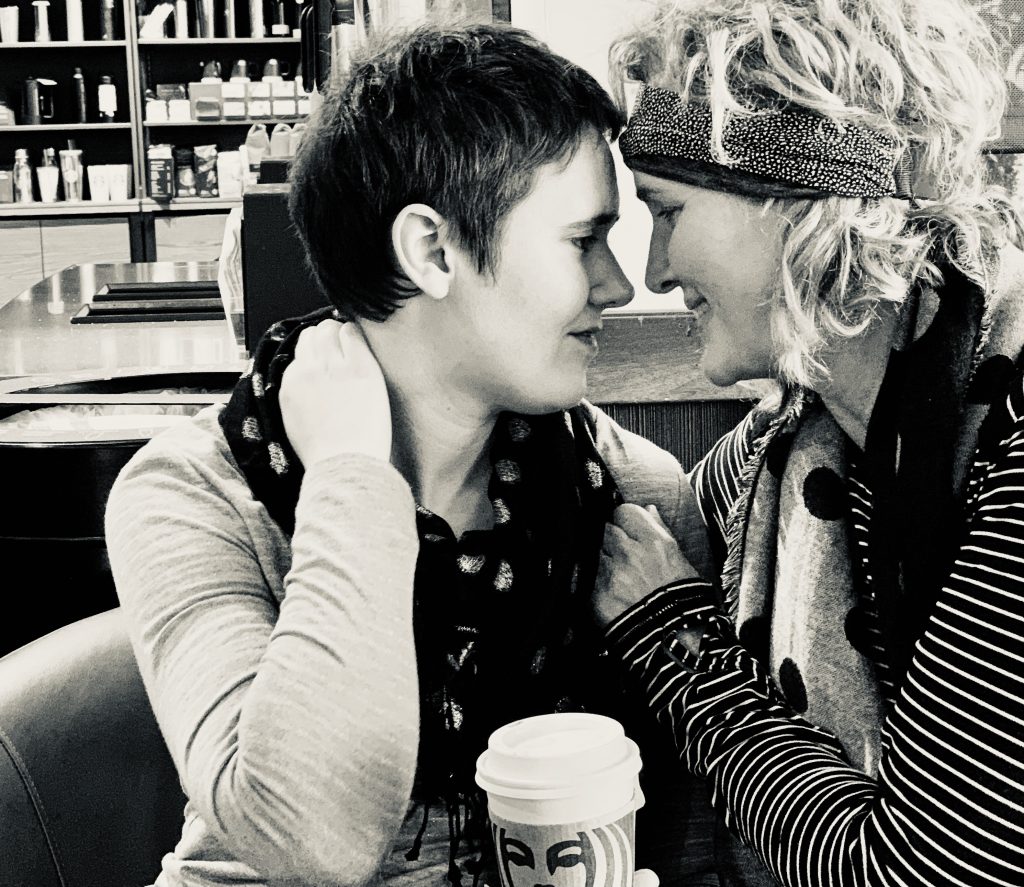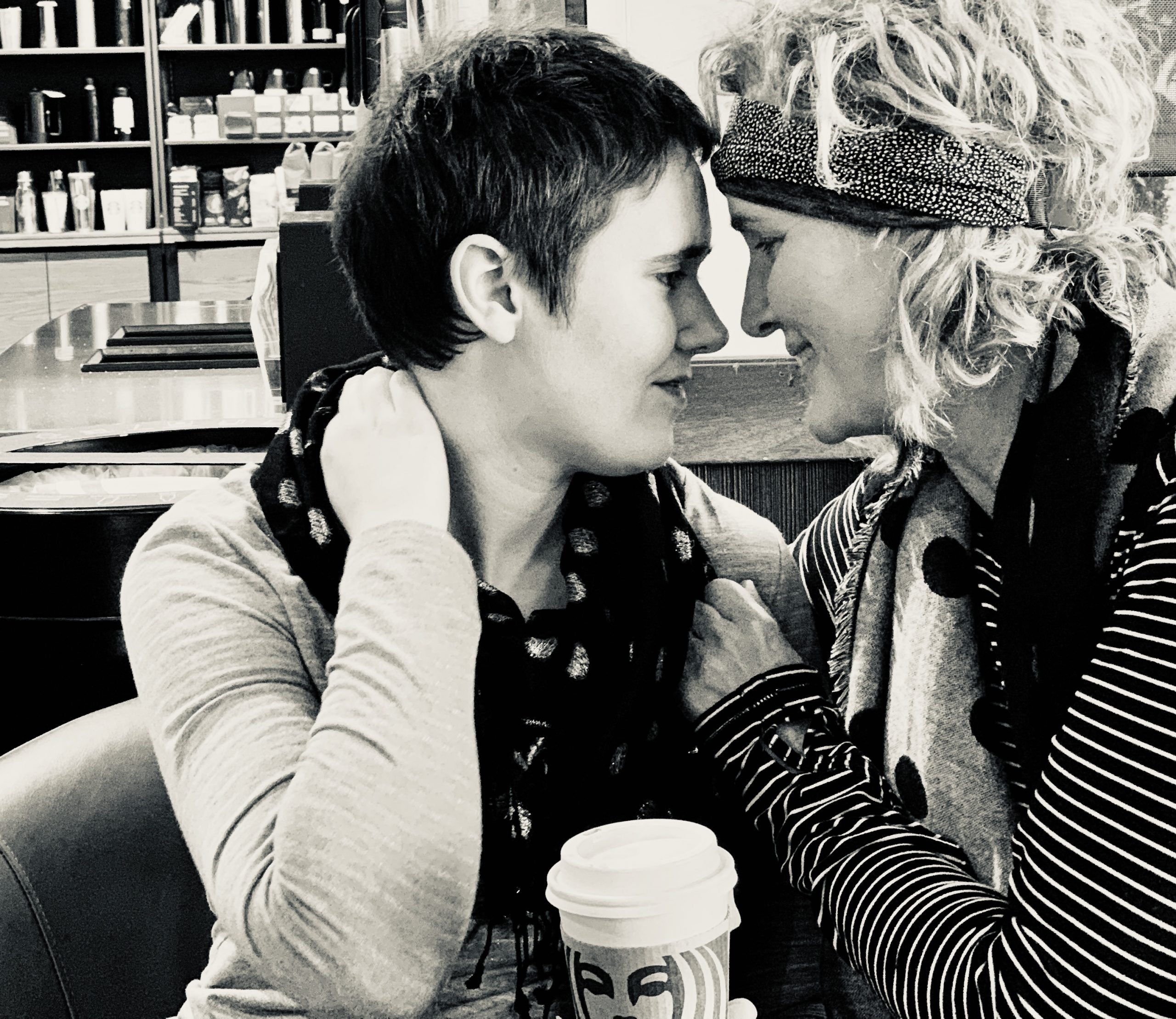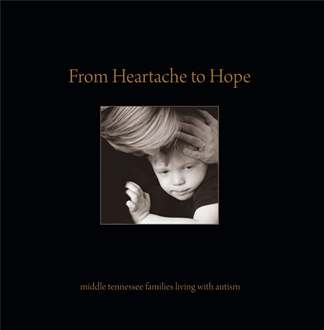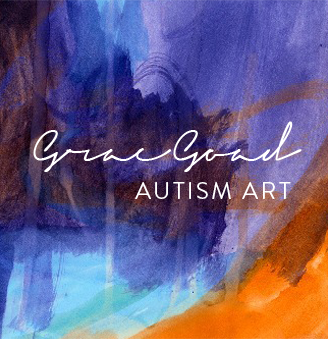
Asheville, NC: post holiday reunion, Jan. 2020
“We are all in the gutter, but some of us are looking at the stars.” —Oscar Wilde
Increasingly, autism research produces “aha” moments for the scientific community. And, as a recent joint study from University of California, Santa Cruz, and the University of Virginia found, many, if not most, mothers of loved ones with autism demonstrate a compassionate, humanizing connection with individuals diagnosed with the still enigmatic disorder.
“The dominant perspective on autism for decades has conceptualized autistic experience and capacity as just the absence of what ‘normal people’ have,” explained UCSC associate professor of philosophy Janette Dinishak. “That’s dehumanizing in itself, but we also have to appreciate how little we come to understand about a person if we just see them as the absence of something else.”
I can tell you this. My daughter is. LOVED. She is loved so incredibly deeply by me, her father and her family. And, she knows it. I embrace all of her just the way she is.
It has helped me tremendously to loosely embrace the keys of Buddhism and metaphysics: It is what is. We are here to learn from this life. We may even come into this lifetime to learn the specific lessons from a particular life experience. I know the latter is not popular. Our culture loves blame-victim mentality. Yet, it’s very disempowering. The book title of a local Episcopalian priest turned therapist, Vanderbilt Meditation Group founder and a self-identified Buddhist-Christian, Gordon Peerman says it all: “Blessed Relief: What Christians Can Learn from Buddhists About Suffering.”
We get to choose how we feel, think and look at our life circumstances. When I ponder if I’m being PollyAnna in this regard, I look to my friends who have such greater challenges with the complex and multiple physical, mental and emotional and behavioral disAbilities of their loved ones. I look to those who have found the silver linings. And, just as I have many times during this pandemic, I think about Anne Frank, about my parents growing up during the depression era. They all created a blueprint for how I could choose to survive. And. Thrive.
When I was shifting into midlife around the turn of the century, I found the writings of Oprah to be inspirational. (Go ahead. Roll your eyeballs.) Through O Magazine, her oracle of positive thinking and pop psychology—which scientists have also found has merit—she led me to, (I know, sounds cheesy,) Michael J. Fox’s Lucky Man, A Memoir about his early onset Parkinson disease. About the same time, though I never read his book, Christopher Reeves, in his fighter-superman spirit, was giving interviews about mental and emotional resiliency regarding his spinal cord injury. And, I recall reading a lengthy article about Trisha Meili, the central park jogger, and how she rose from that horrifying, death-defying experience to create a life of purpose, meaning and joy. I did hear her speak here a few years ago. I was new in my “journey with Grace” and their stories showed me that I had a choice of how I could view my “circumstances”—this life with autism.
I was listening to a podcast yesterday that mentioned seeking mentors who are where you want to be. I flashed back to the first six months of Grace’s diagnosis. I glommed onto then new friends Laura Lloyd, Carolyn Schindler and Tonya Mirtes, leaders in our local autism community who had children a few years older than Grace. They had a sense of peace and purpose in regards to their children with autism. I succumbed, those first few months, to intermittent, flawed thinking about “cures,” but, thankfully, quickly embraced that this was our life path. And then I got to making the best life I could of it. It was a very wise choice and, two decades-plus later, I’m so glad I did.
Here’s a link the research article: http://bit.ly/38lCNkX followed by a couple more excerpts:
“UCSC psychology professor Nameera Akhtar added that the key to flipping the script is to “see the person that’s there,” which mothers in the study demonstrated in a variety of ways. One of the major trends identified in the research was that mothers attributed rich personalities to their nonspeaking autistic children, providing a crucial lens through which to interpret their behavior.
“[…]Ultimately, mothers in the study expressed how crucial it was to arrive at an acceptance of autism that allowed them to focus more on building a strong relationship with their child, rather than trying to change them. The stigmas associated with an autism diagnosis can sometimes obscure this perspective, but the research team hopes the insights from mothers captured within their study may help other families navigate their own paths to building stronger bonds with their children.”
———————————
About the above image: This iPhone picture was taken by my oldest sister in the Asheville, NC, Biltmore Village Starbucks following Grace’s annual two-week post Christmas visit to my sister’s home in South Carolina. The past two January’s, I’ve spent the weekend with my friend Elizabeth Cole in her gorgeous modern urban mountain home. Elizabeth is an international teacher of Nia. After the break, I would drive down, spend the weekend with Elizabeth and my sister and her husband would bring her up to meet me before Grace and I returned home to Nashville….Of course, we’ll be breaking from that tradition this year. Sadly, it was the last time Grace saw her beloved aunt who is more like a grandmother to her. Like you, we’re following orders, staying put and savoring slow and pulling out the stops to make the best of it. #SilverLinings






Thank you for sharing your journey. It’s instructive to read about the acceptance you offer your daughter. I have a child with different challenges, and our relationship would be improved by my adopting more of the stance you are taking. I also value the reading recommendations and the advice to find mentors. Thanks for articulating all of this!